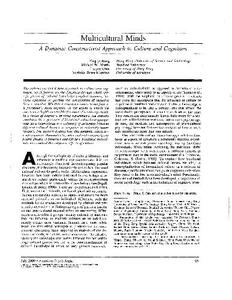
Multicultural Minds PDF
12 Pages·2.136 MB·English
Most books are stored in the elastic cloud where traffic is expensive. For this reason, we have a limit on daily download.
Preview Multicultural Minds
Description:
The authors present a new approach to culture and cognition, which focuses on the dynamics through which specific pieces of cultural knowledge (implicit theories) become operative in guiding the construction of meaning from a stimulus. Whether a construct comes to the fore in a perceiver’s mind depends on the extent to which the construct is highly accessible (because of recentexposure). In a series of cognitive priming experiments, the authors simulated the experience of bicultural individuals (people who have internalized two cultures) of switching between different cultural frames in response to culturally laden symbols. The authors discuss how this dynamic. constructivist approach illuminates (a) when cultural constructsare potent drivers of behavior and (b) how bicultural individuals may control the cognitive effects of culture.
See more
The list of books you might like
Most books are stored in the elastic cloud where traffic is expensive. For this reason, we have a limit on daily download.
